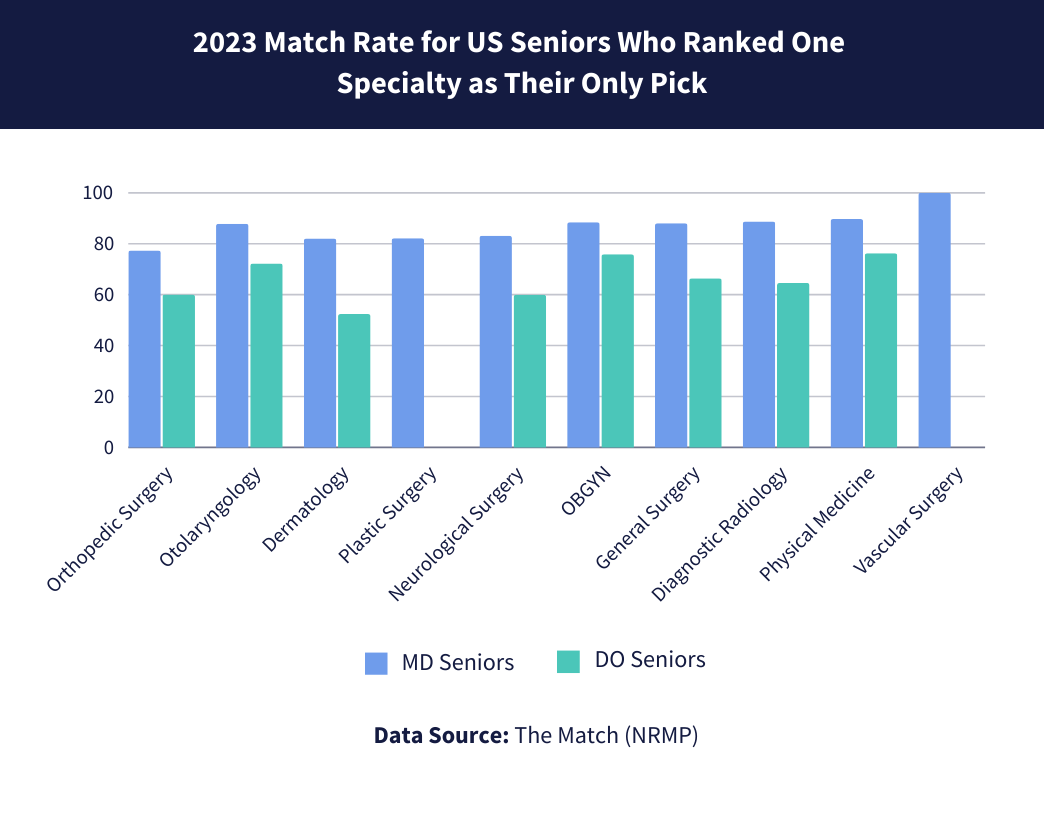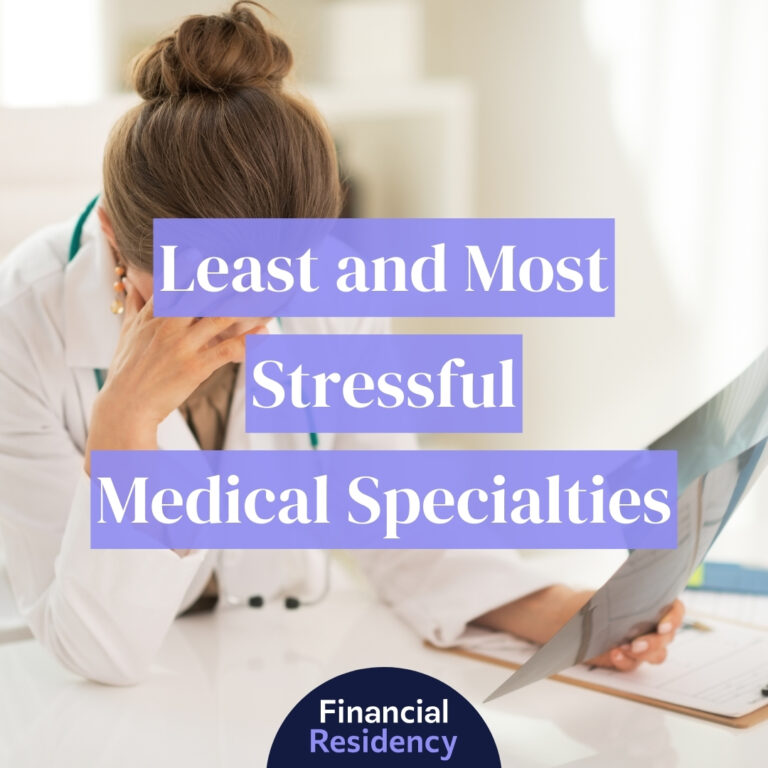Matching into a residency program is one of several necessary steps aspiring physicians must take to complete their training. Residency comes after four years of undergraduate/pre-med courses and at least four years of medical school.
During their fourth year of medical school, medical students participate in Match Week after submitting to the Electronic Residency Application Service (ERAS) and the National Resident Matching Program (NRMP).
Students must match into a specialty residency program to continue their education, but unfortunately, some students go unmatched despite years of hard work and dedication.
If you’re concerned about matching into a residency program, read on for statistics on match rates, tips for success, and advice for the next steps if you don’t match for residency.
How Long Does The Match Process Take?
Students may begin submitting their residency applications during their third or fourth year of medical school. Students find out their residency placements on Match Day during their final year of medical school.
Match Day is the culmination of a week-long med school tradition. Starting on Monday, students find out if they’ve been matched with a residency program.
If you haven’t been matched, your school will contact you and likely work with you to identify your next steps.
For many students, even those who’ve been matched, Match Week can be an emotionally exhausting process because they don’t find out about their residency placement until the end of the week.
What Are Your Chances of Matching for Residency?
In 2023, 93.3% of applicants matched to a residency, according to the NRMP’s 2023 Main Residency Match Report.
Match rates dropped to 67.6% for international medical graduates (IMGs) and to 59.4% for non-U.S. citizens.
DO graduates had slightly lower match rates than students from medical doctor programs, at 91.6%.
But residency program matches have been trending upward in recent years due to efforts from the NRMP.
Residency Program Match-Rate by Specialty
Some medical residency programs are more difficult to match than others. For example, there are higher rates of unmatched students in more competitive specialties such as general surgery, plastic surgery, and dermatology compared to pediatrics, pathology, and internal medicine.

What Are Some Factors That Might Affect Your Chances of Matching?
Several factors can affect your chances of matching with a residency program. Some of these factors include:
- Focus on a geographical area: The match process is an algorithm, and all med students find themselves at the mercy of it. Some students focus their rank order list on a geographical area, hoping they’ll match close to home, but this practice can further reduce the possibility of a match in their specialty.
- Insufficient letters of recommendation: Faculty recommendations and connections can have a big impact on your medical career.
- Low test scores or failed USMLE steps: Medical school exams are designed to predict your likelihood of success in the field. If you’ve failed your boards or earned low test scores on your standardized tests, you may struggle to find a residency placement.
- More competitive specialties: As mentioned above, not all residency programs are created equally. It’s important to evaluate your test scores and other credentials before applying to the more competitive specialties.
- Poor interview skills: Interviews are a crucial part of the match process, so if you interview poorly, you may not make the best impression on your desired residency program.
- Too few residency interviews: There’s a sweet spot for how many residency interviews med students should attend. Attending too few interviews can reduce the number of programs you’re able to match with.
What Are Some Things You Can Do to Increase Your Chances of Matching a Residency?
It’s no secret that the healthcare profession is competitive, especially for aspiring physicians. There are a few steps you can take to increase your chances of matching a residency while you’re earning your medical education.
- Apply early: Ophthalmology, plastic surgery, and urology offer early matching. Early match programs are run independently from the NRMP.
- Craft an exceptional personal statement: Your personal statement is your opportunity to speak to who you are as a person and a doctor. Compelling personal statements will connect with decision-makers during the match process.
- Gain clinical experience: Clinical experience not only allows you to network with doctors and hospitals that interest you, but it also provides a solid work history and shows a commitment to your medical career.
- Participate in student organizations: Extracurricular activities are another way to edge out your competition. Serving as a leader in a student organization demonstrates leadership skills, a factor 63% of residency program directors like to see in their applicants.
- Pursue a dual degree: The AAMC recommends a few different dual degrees for medical students. Pursuing a dual degree can not only help your likelihood of matching, but it can also give you a backup plan if your lifestyle or priorities change throughout your medical education.
- Volunteer: Volunteering your time can make your application stand out. It can also expose you to different areas of medicine while serving underprivileged communities. The NRMP shares that 54% of residency program directors see volunteer background as a factor in whether or not an applicant is invited for an interview.
- Work on research projects: Some specialties will have research requirements, but all medical students can benefit from obtaining research experience.
What Happens to Medical Students Who Don’t Match?
Med students who don’t receive a match through Main Residency Match are eligible to reapply for a different specialty through the Supplemental Offer and Acceptance Program (SOAP).
In 2023, U.S. MD seniors made up 38.3 percent of positions filled during SOAP, while U.S. DO seniors constituted 22.4 percent of positions filled. International medical graduates made up another 28.1% of the total positions filled during SOAP.
Some students who don’t match the first time may wait a year or two to reapply after gaining additional experience and working on their credentials. Roughly half of these students match with a residency the second time around.
What to Do If You Don’t Match into Residency
The application process requires you to submit a rank order list of your top five residency programs across the country.
Not matching with a residency program can be a disappointing and socially isolating experience, especially if you’re surrounded by your celebrating peers, but it doesn’t have to be the end of your medical career.
If you didn’t match, you have options. Most importantly, you can go through the matching process again the following year. If you do, here are some tips to consider.
1. Work On Your Interview Skills
Mentors typically recommend that students interview at least 10 times to increase their odds of matching, but you also want to be intentional about the time you spend interviewing.
Wisdom in the medical community suggests that your odds of matching aren’t increased by attending more than 15 residency interviews.
So it’s important to make your interviews count—eye contact, presentation, groomed physical appearance, strong handshakes, and confidence are all important criteria for success in the matching process.
The goal is to impress, not offend. You may think that your knowledge and grades are enough to make you shine, but the reality is that the matching process is a job application.
It’s important to respect the process, and you show that respect with how you present yourself.
2. Speak Up
Don’t lean into your impulse to isolate if you don’t match.
Reach out to your medical school, particularly your advisor, and ask for feedback as to why you didn’t match. Then, listen carefully to the answer.
If you decide to try to match again, keep in touch with your medical school, and ask for help in preparing to be successful in the next round. Maintaining close connections can even help you secure additional letters of recommendation.
It’s natural to want to be invisible and hide during a stressful and likely embarrassing time, but difficult moments are when you need assistance the most, and your school’s job is to provide that assistance.
Passionate educators and mentors are strongly motivated to help every graduate match and find a job.
3. Teach, Work, or Volunteer in Healthcare
Look for positions teaching pre-med courses at a prep school, tutoring at a testing center, or helping with an MCAT/SAT study service. You can also consider volunteer opportunities at local (and even international) organizations.
The best way to learn anything is to teach it or live it and you will only benefit from this experience, even if it’s a volunteer position. Plus, you’ll build your resume with experience in your field, expand your professional network, bolster your work skills, and earn money.
4. Harness Wisdom from Your Experience
In your second round of matching, you’ll have practice and experience and know what to expect. You’ll have practiced interview skills and first-hand knowledge of the application process.
If you opt not to try to match again, you will still have the experience that comes with going through that process and then reflecting on why you didn’t achieve your goal.
You can use your experience with rejection and hard work to find a fulfilling career path that makes sense for you.
5. Be Realistic
One of the reasons students don’t match is that they focus on specialties in highly competitive fields despite not having the academic record or performance to back it up.
Use this time to be introspective and reflect on your experiences throughout your medical education.
What were the most challenging experiences? How did you do in your clinical rotations? What advice does your faculty have for you? Listen to their feedback, and be honest with yourself.
You may find with self-discovery and personal honesty empower you to select a program that fits your needs.
Another reason students tend not to match is because they rank too few schools. Give yourself options by not putting your eggs all in one basket.
6. Transitional Slot
If low test scores or other knowledge deficits have made it challenging to match, you can request a transitional slot at your medical school before reapplying to a match program.
Transitional slots allow med students to repeat a year of medical school, which often increases the odds of graduating and matching with their preferred program.
Repeating a year isn’t ideal for most students and it’s certainly not cheap, but it can help you strengthen your educational background if you’re passionate about a medical career.
This opportunity can help you achieve your match with a residency program and achieve your long-term goal of a career as a medical doctor.
Paying Back Student Loans After Not Matching into Residency
We know what you’re probably thinking—what about my medical school debt?
Debt is a real and important responsibility, but it doesn’t have to be a shackle.
Taking time to regroup after a career hiccup isn’t a failure and you’re not the first person to pivot after medical school.
Many student loan servicers provide a 6-month grace period after graduation before students have to begin repayment. You can also consider deferment or forbearance if you’re unable to pay back your loans right away.
Income-driven repayment plans will calculate your monthly payments based on your income so you aren’t left with payments you can’t afford.
Private lenders will have their own stipulations and repayment options. It’s a good item to contact them proactively, so you can move on by putting your best foot forward.




